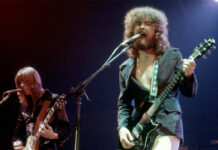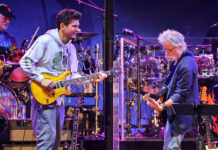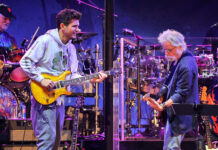
The Genius Of… Dreamtime by Tom Verlaine
Tom Verlaine, who died last week aged 73, wasn’t even the best guitarist in his own band. But he was the best guitarist in the universe.
If you were moping over the Twitter hashtag #tomverlaine after the news of his death broke on Saturday, you’ll have seen one image posted again and again: the cover of Marquee Moon, the 1977 debut album of his brilliant and incalculably influential band, Television. It’s one of the greats alright, and a strong enough signifier of coolness that “This man has never heard Marquee Moon” has become a stock insult to throw at dull people in the news. It is not, however, the undisputed highlight of Verlaine’s career.
READ MORE: The Genius Of… Vertikal by Cult of Luna
Anyone can see what’s great about that record: it’s at the heart of the New York punk movement but it’s way too sophisticated to be punk; the riffing interplay between Verlaine and fellow guitar hero Richard Lloyd is wonderfully creative and melodic; and the solos are nicely expressive without ever getting bluesy or over-long.
The problem with Marquee Moon is that, like the Mona Lisa, it’s such a towering monument of ‘classicness’ that actually appreciating it as a piece of art can be difficult. You don’t really need to listen to it any more – it’s just there.
But you definitely do need to listen to Adventure, its 1978 sequel; and then it’s worth going back to the solo albums Verlaine made through the 80s – starting, if you don’t know it already, with Dreamtime.
Carried away
Adventure has been called something of sophomore slump: a follow-up to the unfollowable. Yes, it lacks the tension and excitement of Marquee Moon, trading some of that elaborate counterpoint for more relaxed and spacey textures – and that makes it less of a pure ‘New York’ record. But it also means there’s a little more room in there for Verlaine, in particular, to spread his spindly wings.
A difference in styles had been clear from the first two tracks of Marquee Moon – Lloyd’s solo on See No Evil is clean, confident and disciplined, while Verlaine’s effort on Venus hovers around the beat with a quivering cluck – and you can hear them drifting ever further apart on Adventure. Lloyd’s solos are still fine – he’s clearly the technically superior player – but Verlaine basically invents alternative guitar on The Fire.
This is the perfect illustration of why expressive sensitivity is worth more than widdly chops. You don’t just hear the notes Tom plays in this steadily escalating solo – you feel them clambering out of his soul and leaping into the air around your ears.
Lead playing had never been this vulnerable before, this human – and you might argue that it never would be again. For Verlaine himself, the fact that he would soon move on from brittle-toned Jazzmasters to smoother-sounding Strats was probably a factor in that… but it may be that he just practised a little too much and became, tragically, too good at the guitar.
For his solo career, then, he needed to take a slightly different tack.
Image: Gie Knaeps / Getty Images
A future in noise
Verlaine didn’t hang about after Television broke up in 1978 – his self-titled debut album came out the following year and he kept on pumping them out until the band reformed, in a slightly messy on/off sort of way, in 1992.
That first solo record is, let’s be honest, not special; but with the second one, released in 1981, you can hear him getting the hang of it. Dreamtime is closer in style to Marquee Moon than it is to Adventure: the songs are tightly structured, the guitar parts are artfully layered, and the solos are generally short but strident.
The opening track, There’s A Reason, is almost pure Television. A couple of solid post-punkers follow before Tom indulges himself in a low-key interlude, The Blue Robe, complete with jaggedly expressive noodling – and then we hit Without A Word.
A melancholy look at mortality, this is a really pretty song by any standards, but it’s lifted beyond that by its solo – a lyrical excursion of less than 20 seconds that arrives on the crest of a gloriously uplifting key change. The playing is not especially passionate or technically impressive, but it’s a perfect demonstration of adherence to the 11th commandment: Thou shalt serve the frickin’ song.
Image: Gie Knaeps / Getty Images
That’s the peak of Dreamtime, and things do get a little uneven as it winds its way towards the catchy climax of Mary Marie. But the point has been made: Tom Verlaine is not just a maverick guitar-slinger now, but a mature song-crafter in his own right.
What happens next? A few more middling albums, then one that’s actually even better than Dreamtime: 1987’s Flash Light, a minor masterpiece let down only by its boomingly over-processed 80s production. Flash Light could easily have been the subject of this story, except that it’s kind of pointless to recommend a record that isn’t on any of the streaming services. Still, do hunt it down – the songwriting is as strong as the playing, and in between those clattering snare beats you’ll hear some of the sweetest AC30 tones ever recorded.
Television’s 1992 reunion album (annoyingly just called Television) is surprisingly good, even if it runs out of ideas long before the end, and there was talk of another one in the can – albeit without Richard Lloyd – as long ago as 2011. Whether or not that ever appears, Tom Verlaine’s multi-dimensional legacy is secure: singer, songwriter, Jazzmaster rehabilitator… and the guitar god for people who hate guitar gods.
Image: Hayley Madden / Redferns
Standout guitar moment
Without A Word
For more reviews, click here.
The post The Genius Of… Dreamtime by Tom Verlaine appeared first on Guitar.com | All Things Guitar.
Source: www.guitar-bass.net












